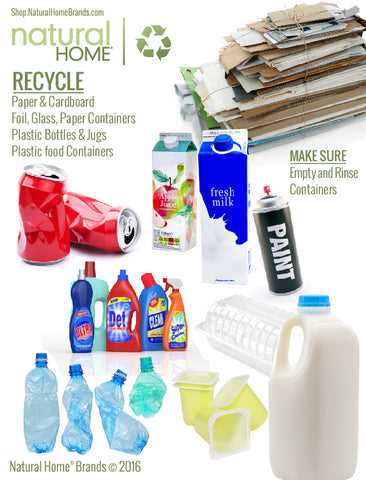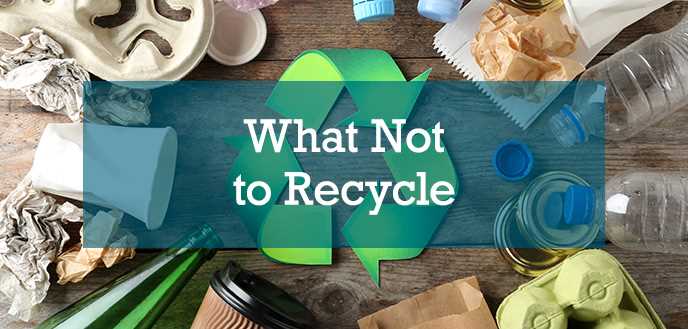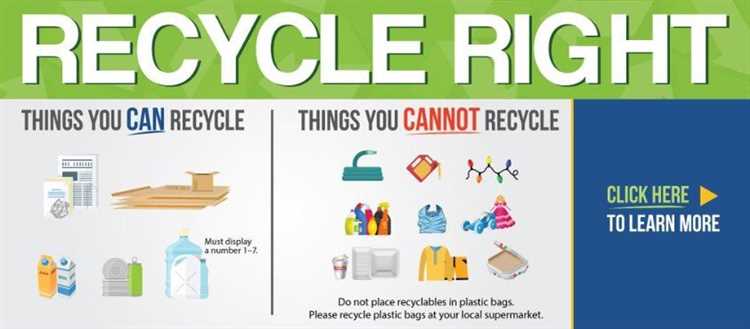Recycling has become an essential part of our daily lives, helping to reduce waste and preserve the environment. However, not everything can be recycled. In fact, there are certain items that should never be tossed in the recycling bin, as they can contaminate the recycling process and cause significant damage to recycling facilities.
One item that should never be put in the recycling bin is plastic bags. While they may seem harmless, plastic bags can create a lot of problems for recycling facilities. They can get tangled in the sorting machinery, causing costly breakdowns and delays. It is estimated that plastic bags cost recycling facilities millions of dollars each year in maintenance and repairs. Instead of tossing them in the recycling bin, reuse them or take them to a designated drop-off location.
Another item that cannot be recycled is greasy pizza boxes. While cardboard boxes are typically recyclable, pizza boxes are an exception. The reason behind this is the leftover food and grease that often contaminates the cardboard. The grease can’t be separated from the paper fibers during the recycling process, making the entire batch unusable. It is best to tear off any clean parts of the pizza box and recycle them, while the greasy parts should be thrown in the trash.
- Non-Recyclable Items: What Really Can’t Be Recycled
- 1. Plastic Bags
- 2. Styrofoam
- 3. Broken Glass
- The Environmental Impact of Improper Recycling
- Contamination of Recycling Streams
- Waste of Resources
- Three Common Items That Shouldn’t Go in the Recycling Bin
- 1. Plastic Bags
- 2. Styrofoam
- 3. Clothing
- Plastic Bags: A Major Recycling Problem
- Dirty Takeout Containers: Grease is the Enemy
- Q&A:
- Can plastic bags be recycled?
- What about pizza boxes, can they be recycled?
- Is it okay to recycle paper towels?
- What should I do with old clothing that cannot be recycled?
- Can I recycle broken glass?
- Can plastic bags be recycled?
Non-Recyclable Items: What Really Can’t Be Recycled
Recycling is a great way to reduce waste and preserve valuable resources. However, not all items are suitable for recycling. It’s important to know which items should never be tossed in the recycling bin to avoid contaminating the recycling process. Here are three non-recyclable items that you should avoid putting in your recycling bin:
1. Plastic Bags

Plastic bags, such as grocery bags, cannot be recycled with your regular recyclables. The thin and flexible nature of plastic bags can clog recycling equipment, causing malfunctions and leading to costly repairs. Instead, many grocery stores have collection bins specifically for plastic bags, where they can be recycled separately.
2. Styrofoam

Styrofoam, also known as expanded polystyrene, is not recyclable in most curbside recycling programs. This lightweight material is difficult to recycle due to its low density and limited market demand for recycled foam products. Instead of tossing it in the recycling bin, check if there are nearby drop-off locations that accept Styrofoam for recycling.
3. Broken Glass
While glass bottles and jars are generally recyclable, broken glass should not be placed in your recycling bin. The shards of broken glass can pose a safety hazard to workers at recycling facilities. It’s best to carefully wrap broken glass in newspaper or place it in a sturdy bag before disposing of it in the regular trash bin.
Remember, proper recycling starts with knowing what can and cannot be recycled. By avoiding these non-recyclable items, you can help ensure that the recycling process is efficient and effective, reducing waste and protecting the environment.
| Non-Recyclable Items | Proper Disposal Method |
|---|---|
| Plastic Bags | Use designated collection bins at grocery stores |
| Styrofoam | Check for nearby drop-off locations for recycling |
| Broken Glass | Wrap in newspaper or place in a sturdy bag and dispose in regular trash bin |
The Environmental Impact of Improper Recycling
Recycling is an important step towards reducing waste and preserving our environment. However, when items that cannot be recycled are tossed into the recycling bin, it can have a negative impact on the recycling process and the environment as a whole.
Contamination of Recycling Streams
Improperly recycling items that aren’t accepted can contaminate the recycling stream. This means that when these items are mixed with recyclable materials, it becomes more difficult to separate and process the valuable recyclables. Contamination can lead to a decrease in the quality of recycled products and may even result in entire batches of materials being rejected for recycling.
Waste of Resources
When non-recyclable items make their way into the recycling system, it not only wastes the effort put into recycling those items, but it also wastes valuable resources. For example, if plastic bags are mistakenly tossed into the recycling bin, they can get tangled in the machinery at recycling facilities, causing disruptions and potential damage. This not only slows down the recycling process but also wastes energy and resources.
Proper education and awareness are crucial in ensuring that the right items are recycled. Understanding what can and cannot be recycled and properly disposing of those items can make a significant difference in preserving our environment. It is important to follow the recycling guidelines provided by your local recycling program and to stay informed about any changes or updates regarding recycling practices.
Remember, recycling is a collective effort that requires everyone’s participation to be effective. By recycling correctly, we can contribute to the preservation of our planet’s natural resources and reduce the amount of waste that ends up in landfills or pollutes our oceans and ecosystems.
Three Common Items That Shouldn’t Go in the Recycling Bin
Recycling is a great way to reduce waste and protect the environment, but it’s important to know what can and can’t be recycled. While many items can be recycled, there are some common items that should never be tossed in the recycling bin. These items can contaminate the recycling process and cause damage to recycling facilities.
1. Plastic Bags
Plastic bags, like grocery bags and trash bags, should not be placed in the recycling bin. They can get tangled in sorting machines and cause breakdowns. Instead, reuse plastic bags or look for recycling programs specifically for plastic bags, often found in grocery stores.
2. Styrofoam
Styrofoam, or expanded polystyrene foam, is not accepted by most recycling programs. Styrofoam can break into small pieces that are difficult to sort and can contaminate other recyclables. It’s best to avoid buying products packaged in Styrofoam and look for alternatives whenever possible.
3. Clothing
While clothing is made from recyclable materials like fabrics, it should not be placed in the recycling bin. Clothing is best donated to thrift stores or other charitable organizations. If clothing is in poor condition, it can be used as rags or repurposed before being discarded in the trash bin.
Remember, proper recycling is important for maintaining the effectiveness of recycling programs. By avoiding these common items in the recycling bin, you can help ensure a smooth and efficient recycling process.
Plastic Bags: A Major Recycling Problem

Plastic bags have become a major recycling problem in recent years. Despite being widely used and easily accessible, plastic bags cannot be tossed in the recycling bin and often end up in landfills or as litter in our environment.
One of the main issues with recycling plastic bags is that they get tangled in the sorting machines at recycling facilities. These machines are designed to separate different types of recyclable materials, but plastic bags can clog the equipment and disrupt the entire process.
Moreover, plastic bags are made from a type of plastic called low-density polyethylene (LDPE), which is not easily recyclable. LDPE plastic is stretchy, lightweight, and not easily broken down through traditional recycling methods. This makes it challenging to transform plastic bags into new products and limits their ability to be recycled.
While some stores offer plastic bag recycling programs, they are not as common as other recycling options, such as paper or glass. Additionally, even when plastic bags are collected for recycling, the demand for recycled plastic bags is relatively low, making it economically unfeasible for many recycling facilities to process them.
To address the issue of plastic bags, it is crucial to reduce their usage and explore alternative options. Reusable bags made of fabric or other durable materials are an excellent substitute for plastic bags. Additionally, many stores now offer recycling programs specifically for plastic bags, allowing consumers to drop off their bags for proper recycling.
In conclusion, plastic bags pose a major recycling problem due to their inability to be easily recycled and their impact on sorting machines at recycling facilities. It is essential for individuals to be aware of the challenges associated with recycling plastic bags and make conscious choices to reduce their usage and properly recycle them when possible.
Dirty Takeout Containers: Grease is the Enemy
When it comes to recycling, dirty takeout containers are a big no-no. These containers, often made of paper or cardboard, may seem like they belong in the recycling bin. However, if they are contaminated with grease or food residue, they cannot be recycled.
The grease and food residue can contaminate other recyclable materials, making them unusable. It can also lead to a lower quality of recycled paper and cardboard products. So, even if the container is made of a recyclable material, its dirty state renders it unrecyclable.
It’s important to properly dispose of dirty takeout containers in the trash instead of tossing them into the recycling bin. This ensures that they don’t contaminate other recyclable materials and allows for a more effective recycling process.
To reduce waste, consider using reusable containers for your takeout meals or opt for eateries that offer compostable or biodegradable packaging.
Remember, when it comes to recycling, grease is the enemy!
Q&A:
Can plastic bags be recycled?
No, plastic bags should not be put in the recycling bin. Most recycling facilities are not equipped to handle plastic bags and they can cause damage to the machinery. However, many grocery stores have drop-off bins specifically for plastic bags recycling.
What about pizza boxes, can they be recycled?
Pizza boxes can be a tricky one. If the pizza box is clean and free of any grease or food residue, it can be recycled. However, if there are oil stains or food remnants on the box, it should be thrown in the trash instead. The grease and oil can contaminate other recyclables and make the whole batch unrecyclable.
Is it okay to recycle paper towels?
No, paper towels cannot be recycled. Paper towels are usually made from lower grade paper fibers that cannot be recycled. Additionally, they are often contaminated with food residue or cleaning chemicals, which makes them unsuitable for recycling. Paper towels should be thrown in the trash.
What should I do with old clothing that cannot be recycled?
If your old clothing is not in good enough condition to be donated or given away, the best option is to repurpose or upcycle it. You can turn old t-shirts into cleaning rags, make quilts out of old fabric, or even use them for craft projects. If the clothing is beyond use, it should be thrown in the trash.
Can I recycle broken glass?
No, broken glass cannot be recycled. Broken glass poses a safety hazard to workers at recycling facilities and can cause damage to the equipment. It is best to carefully wrap the broken glass in several layers of newspaper or place it in a sturdy bag before disposing of it in the trash.
Can plastic bags be recycled?
No, plastic bags cannot be recycled in regular recycling bins. They can clog the recycling machines and cause damage. Instead, many grocery stores have drop-off bins where you can bring your plastic bags for recycling.